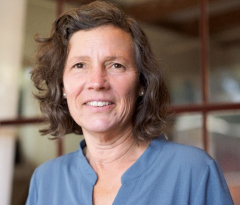
Prof. Emerit Jennifer Freyd
Editor’s Notes: As we reported in mid-March, UO Professor Emerit Jennifer Freyd shared with us an important update on her pay equity court case (funded in part through the AAUW Legal Advocacy Fund). Jennifer has sent us additional updates since then! We will continue to post updates in our Branch News column as she shares them. We share two updates below, one from April 23rd and another from April 29th. In each, Professor Freyd announced as follows:
April 23, 2021
Dear Colleagues,
As you may recall on March 15, 2021 the Ninth Circuit Court of Appeals granted my appeal (regarding a pay inequity lawsuit I filed in March 2017, requesting then a jury trial that so far I have not been able to have), ordering the pay inequity case back to the district court to proceed to a jury trial.
On March 29 the UO administration filed a petition with the Ninth Circuit for rehearing en banc and issued a press release and circulated it on campus via AroundtheO about their petition.
Today the Ninth Circuit has ruled that: “Appellee’s petition for rehearing en banc, filed March 29, 2021, is DENIED.” That is, the March 15 decision stands.
It is my understanding that the case will go back to the district court for a jury trial unless the UO administration initiates an appeal to the US Supreme Court. For more on some of the implication of this case for so many others including the graduate students in this department, see:
- Freyd v. University of Oregon, No. 19-35428 (9th Cir. March 15, 2021), American Association of University Professors (AAUP), March 2021
- Federal appeals court revives UO professor’s suit alleging ‘glaring’ pay gap between her and male counterparts, by Maxine Bernstein, The Oregonian/OregonLive, 17 March 2021.
- Recent Ninth Circuit Equal Pay Act Decision A Reminder To Examine and Eliminate Gender-Based Pay Disparity (US), The National Law Review, Volume XI, Number 76, 17 March 2021.
As I wrote in March: I hope that the University of Oregon will now move forward in the spirit of equity and justice.
Jennifer J. Freyd, PhD, Professor Emerit of Psychology, University of Oregon
Editor, Journal of Trauma & Dissociation
Affiliated Faculty, Women’s Leadership Lab, Stanford University
Founder and President, Center for Institutional Courage
April 29, 2021
Dear Friends,
The UO Senate was planning to discuss on Wednesday April 28 the Senate Motion with 90+ Co-Sponsors: “The UO Senate opposes any further efforts by the UO Administration to limit the availability of the Equal Pay Act’s protections in professional settings.”
On the evening of Tuesday April 27 the UO Senate President sent out an email to all UO Senators with a letter from the UO’s General Counsel, Kevin Reed, directed to the Senate regarding the motion. Within the 5-page attached letter from UO General Counsel Kevin Reed were these words:
The core of the resolution seems directed at persuading the university not to pursue further review of the summary judgment decision in the United States Supreme Court. Such persuasion is misplaced, as the university has decided to proceed to trial in this matter and not to seek Supreme Court review at this stage.
There were some follow-up emails on the Senate mailing list including an email from the General Counsel Wednesday morning directed at one of the motion co-sponsors, sent to all senators. While disagreeing with most of the innuendos and claims in this missive, I share here with the thought the communication is data:
Had you truly been interested in a dialog, you would have spoken to me about our position in litigation before presenting a resolution crafted by advocates relying on information presented by people who hope to make hundreds of thousands of dollars in this litigation. I just want the facts presented, and see no purpose in litigating this case with you or other advocates in a livestreamed meeting. I am happy to leave it for the courtroom which is, after all, the forum Prof. Freyd and her counsel chose, without warning, when we were in the middle of discussions about resolving Prof. Freyd’s concerns.
At the Senate meeting on Wednesday afternoon the motion finally made it to the floor at 4:45 PM. Beatrice Dohrn of the School of Law, one of the lead co-sponsors of the motion, discussed the letter from the General Counsel. She noted that the motion had two purposes. One was to dissuade the university administration from continuing to appeal the 9th Circuit ruling. The other was to educate the administration on the broad and harmful impact the UO’s legal position could have on the UO’s own students and staff. Dohrn noted that the first goal was achieved but the second goal apparently was not given much of the content of the 5-page letter. Dohrn then addressed three points, educating all in a concise and clear manner. After that Dohrn explained that the sponsors were withdrawing the motion given the successful achievement of the first goal. The meeting ended quickly, before 4:50.
The Senate meeting was recorded and the recording is available for viewing. I surely recommend viewing Dohrn’s short (~4 min) speech. It is short, clear, and powerful. To do that, follow these two steps:
Open the video recording by clicking here. (If that does not work for you, go to the page of senate meetings and select “watch” associated with the April 28 meeting.)
Next. move the cursor at the bottom of the video screen to 1:42:00. Then hit play. Watch for 4 minutes.
Although some viewers yesterday were disappointed the motion was withdrawn, I see the fact that a vote on the motion was no longer needed as a major success; the existence of the motion with its 90+ co-sponsors did its work before the vote ever had to happen. The lead co-sponsors worked very hard and they and all the co-sponsors were brave. All that effort and courage amounted to grass-roots institutional courage, producing a good outcome for equity and justice.
Now my lawsuit should finally – more than 4 years after filing — go back to the district court for trial.

